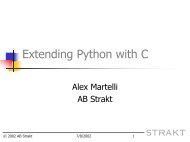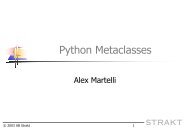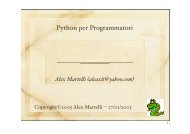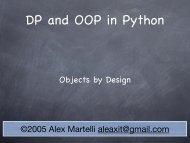callback patterns and idioms in Python
callback patterns and idioms in Python
callback patterns and idioms in Python
Create successful ePaper yourself
Turn your PDF publications into a flip-book with our unique Google optimized e-Paper software.
Don't call us, we'll call you:<br />
<strong>callback</strong> <strong>patterns</strong> <strong>and</strong> <strong>idioms</strong> <strong>in</strong> <strong>Python</strong><br />
http://www.aleax.it/pyc08_cback.pdf<br />
©2008 Google -- aleax@google.com
Audience levels for this talk<br />
Shu<br />
("Reta<strong>in</strong>")<br />
Ha<br />
("Detach")<br />
Ri<br />
("Transcend")<br />
2
The "Callback" concept<br />
it's all about library/framework code that<br />
"calls back" <strong>in</strong>to YOUR code<br />
rather than the "traditional" (procedural)<br />
approach where YOU call code supplied as<br />
entry po<strong>in</strong>ts by libraries &c<br />
"the Hollywood pr<strong>in</strong>ciple": "don't call us,<br />
we'll call you"<br />
co<strong>in</strong>age: Richard E. Sweet, <strong>in</strong> "The Mesa Programm<strong>in</strong>g<br />
Environment", SigPLAN Notices, July 1985<br />
for: customization (flexibility) <strong>and</strong> "event-driven"<br />
architectures ("actual" events OR "structur<strong>in</strong>g of<br />
control-flow" ["pseudo" events])<br />
3
"Callback" implementation<br />
give "somebody" a callable<br />
the "somebody" may store it "somewhere"<br />
a conta<strong>in</strong>er, an attribute, whatever<br />
or even just keep it as a local variable<br />
<strong>and</strong> calls it "when appropriate"<br />
when it needs some specific functionality<br />
(i.e., for customization)<br />
or, when appropriate events "occur" (state<br />
changes, user actions, network or other<br />
I/O, timeouts, system events, ...) or "are<br />
made up" (structur<strong>in</strong>g of control-flow)<br />
4
Customization<br />
5
Customiz<strong>in</strong>g sort (by key)<br />
mylist.sort(key=str.toupper)<br />
h<strong>and</strong>ily, speedily embodies the DSU pattern:<br />
def DSU_sort(mylist, key):<br />
aux = [ (key(v), j, v)<br />
for j, v <strong>in</strong> enumerate(mylist)]<br />
aux.sort()<br />
mylist[:] = [v for k, j, v <strong>in</strong> aux]<br />
Note that a little "workaround" is needed wrt the<br />
usual "call a method on each object" OO idiom...<br />
6
OO customiz<strong>in</strong>g: the TM DP<br />
"Template Method" Design Pattern: perform<br />
the <strong>callback</strong>s by "self delegation":<br />
class TMparent(object):<br />
...self.somehook()...<br />
<strong>and</strong> customize by <strong>in</strong>herit<strong>in</strong>g & overrid<strong>in</strong>g:<br />
class TMchild(TMparent):<br />
...def somehook(self):...<br />
h<strong>and</strong>y, compact, sometimes a bit rigid<br />
http://video.google.com/videoplay?<br />
docid=-5434189201555650834 <strong>and</strong> http://<br />
www.aleax.it/goo_pydp.pdf (49ff) for more<br />
7
Customiz<strong>in</strong>g schedul<strong>in</strong>g<br />
sched needs TWO <strong>callback</strong> functionalities:<br />
what time is it right now?<br />
wait (sleep) until time T<br />
the OO way (more structured):<br />
import time<br />
s=sched(time)<br />
the FP way (more flexible):<br />
s=sched(time.time, time.sleep)<br />
you might supply default <strong>callback</strong>s, or not<br />
(Dependency Injection DP & variants)<br />
8
Events<br />
9
K<strong>in</strong>ds of "Event" <strong>callback</strong>s<br />
Events "proper"...:<br />
Observer/Observable design pattern<br />
GUI frameworks (mouse, keyboard, ...)<br />
asynchronous (event-driven) I/O (net &c)<br />
"system-event" <strong>callback</strong>s<br />
Pseudo-events for "structur<strong>in</strong>g" execution:<br />
"event-driven" pars<strong>in</strong>g (SAX &c)<br />
"scheduled" <strong>callback</strong>s (sched)<br />
"concurrent" <strong>callback</strong>s (threads &c)<br />
tim<strong>in</strong>g <strong>and</strong> debugg<strong>in</strong>g (timeit, pdb, ...)<br />
10
The Observer DP<br />
a "target object" lets you add "observers"<br />
could be simple callables, or objects<br />
when the target's state changes, it calls<br />
back to "let the observers know"<br />
design choices: "general" observers<br />
(<strong>callback</strong>s on ANY state change), "specific"<br />
observers (<strong>callback</strong>s on SPECIFIC state<br />
changes; level of specificity may vary),<br />
"grouped" observers (objects with >1<br />
methods for k<strong>in</strong>ds of state-change), ...<br />
11
Events <strong>in</strong> GUI frameworks<br />
the most classic of event-driven fields<br />
e.g, consider Tk<strong>in</strong>ter:<br />
elementary <strong>callback</strong>s e.g. for buttons:<br />
b=Button(parent, text='boo!', comm<strong>and</strong>=...)<br />
flexible, advanced <strong>callback</strong>s <strong>and</strong> events:<br />
wgt.b<strong>in</strong>d(event, h<strong>and</strong>ler)<br />
event: str<strong>in</strong>g describ<strong>in</strong>g the event (e.g.<br />
'', '', '', ...)<br />
h<strong>and</strong>ler: callable tak<strong>in</strong>g Event argument<br />
(w. attributes .widget, .x, .y, .type, ...)<br />
can also b<strong>in</strong>d by class, all, root w<strong>in</strong>dow...<br />
12
Callback issues<br />
what arguments are to be used on the call?<br />
no arguments: simplest, a bit "rough"<br />
<strong>in</strong> Observer: pass as argument the target<br />
object whose state just changed<br />
lets 1 callable observe several targets<br />
or: a "description" of the state changes<br />
saves "round-trips" to obta<strong>in</strong> them<br />
other: identifier or description of event<br />
but -- what about other arguments (related<br />
to the callable, not to the target/event)...?<br />
13
Fixed args <strong>in</strong> <strong>callback</strong>s<br />
functools.partial(callable, *a, **kw)<br />
pre-b<strong>in</strong>d any or all arguments<br />
however, note the difference...:<br />
x.setCbk(functools.partial(f, *a, **kw))<br />
vs<br />
x.setCbk(f, *a, **kw)<br />
...hav<strong>in</strong>g the set-<strong>callback</strong> itself accept (<strong>and</strong><br />
pre-b<strong>in</strong>d) arguments is far neater/h<strong>and</strong>ier<br />
sombunall 1 <strong>Python</strong> <strong>callback</strong> systems do that<br />
1<br />
: Robert Anton Wilson<br />
14
Callback "dispatch<strong>in</strong>g"<br />
what if more than one <strong>callback</strong> is set for a<br />
s<strong>in</strong>gle event (or, Observable target)?<br />
remember <strong>and</strong> call the latest one only<br />
simplest, roughest<br />
remember <strong>and</strong> call them all<br />
LIFO? FIFO? or...?<br />
how do you _remove_ a <strong>callback</strong>?<br />
can one <strong>callback</strong> "preempt" others?<br />
can events (or state changes) be "grouped"?<br />
use object w/methods <strong>in</strong>stead of callable<br />
15
Callbacks <strong>and</strong> Errors<br />
are "errors" events like any others?<br />
or are they best s<strong>in</strong>gled-out?<br />
http://www.python.org/pycon/papers/deferex/<br />
Twisted Matrix's "Deferred" pattern: one<br />
Deferred object holds...<br />
N "cha<strong>in</strong>ed" <strong>callback</strong>s for "successes" +<br />
M "cha<strong>in</strong>ed" <strong>callback</strong>s for "errors"<br />
each <strong>callback</strong> is held WITH opt *a, **kw<br />
plus, argument for "event / error<br />
identification" (or, result of previous<br />
<strong>callback</strong> along the appropriate "cha<strong>in</strong>")<br />
16
System-events <strong>callback</strong>s<br />
for various <strong>Python</strong> "system-events":<br />
atexit.register(callable, *a, **k)<br />
oldh<strong>and</strong>ler = signal.signal(signum, callable)<br />
sys.displayhook, sys.excepthook,<br />
sys.settrace(callable)<br />
extension modules do that, too...:<br />
readl<strong>in</strong>e.set_startup_hook,<br />
set_pre_<strong>in</strong>put_hook, set_completer<br />
17
"Pseudo" events<br />
"events" can be a nice way to structure<br />
execution (control) flow<br />
so <strong>in</strong> some cases "we make them up" (!)<br />
just to allow even-driven <strong>callback</strong>s <strong>in</strong><br />
otherwise non-obvious situations;-)<br />
pars<strong>in</strong>g, schedul<strong>in</strong>g, concurrency, tim<strong>in</strong>g,<br />
debugg<strong>in</strong>g, ...<br />
18
Event-driven pars<strong>in</strong>g<br />
e.g. SAX for XML<br />
"events" are start <strong>and</strong> end of tags<br />
h<strong>and</strong>lers are responsible for keep<strong>in</strong>g stack<br />
or other structure as needed<br />
often not necessary to keep all...!<br />
at the other extreme: XML's DOM<br />
somewhere <strong>in</strong>-between: "pull DOM"...<br />
events as "stream" rather than <strong>callback</strong><br />
can "exp<strong>and</strong> node" for DOMy subtrees<br />
19
Scheduled <strong>callback</strong>s<br />
st<strong>and</strong>ard library module sched<br />
s = sched.Sched(timefunc, delayfunc)<br />
e.g, Sched(time.time, time.sleep)<br />
evt = s.enter(delay, priority, callable, arg)<br />
or s.enterabs(time, priority, callable, arg)<br />
may s.cancel(evt) later<br />
s.run() runs events until queue is empty (or<br />
an exception is raised <strong>in</strong> callable or<br />
delayfunc: it propagates but leaves s <strong>in</strong><br />
stable state, s.run can be called aga<strong>in</strong> later)<br />
20
"Concurrent" <strong>callback</strong>s<br />
thread<strong>in</strong>g.Thread(target=..,args=..,kwargs=..)<br />
call backs to target(*args,**kwargs)<br />
at the t.start() event [or later...]<br />
*<strong>in</strong> a separate thread* (the key po<strong>in</strong>t!-)<br />
stacklet.tasklet(callable)<br />
calls back accord<strong>in</strong>g to setup<br />
when tasklet active <strong>and</strong> front-of-queue<br />
channels, reactivation, reschedul<strong>in</strong>g<br />
process<strong>in</strong>g.Process(...like thread<strong>in</strong>g.Thread...)<br />
NWS' sleigh: eachElem, eachWorker<br />
21
Tim<strong>in</strong>g <strong>and</strong> debugg<strong>in</strong>g<br />
timeit.Timer(stmt, setup)<br />
*str<strong>in</strong>g* arguments to compile & execute<br />
a dynamic-language twist on <strong>callback</strong>!-)<br />
"event" for <strong>callback</strong>:<br />
setup: once, before anyth<strong>in</strong>g else<br />
stmt: many times, for tim<strong>in</strong>g<br />
the pdb debugger module lets you use<br />
either str<strong>in</strong>gs or callables...:<br />
pdb.run <strong>and</strong> .runeval: str<strong>in</strong>gs<br />
pdb.runcall: callable, arguments<br />
22
Q & A<br />
http://www.aleax.it/pyc08_cback.pdf<br />
? !<br />
23













